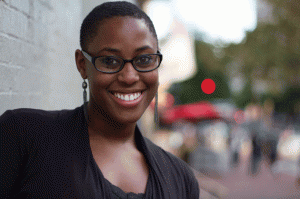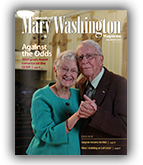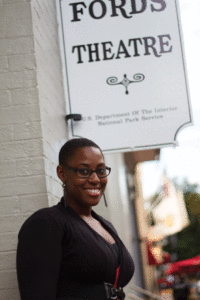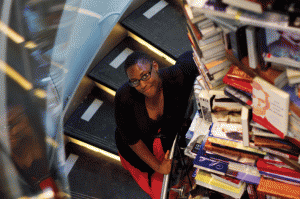Shayla Roland ’10 found herself in the basement of the Wyoming home of Judy and Dennis Shepard, sorting through thousands of letters. The notes − sent in an outpouring of support after the 1998 murder in Laramie of the Shepards’ gay son, Matthew − had remained largely untouched since.

In conjunction with the fall production of The Laramie Project at Ford’s Theatre, Shayla Roland helped create an exhibit of letters sent to the parents of Matthew Shepard after their son was murdered in 1998 because he was gay. Photo courtesy of Teresa Wood Photography.
When Roland was studying to be a stage manager at the University of Mary Washington, she couldn’t have imagined doing work like this to support a major stage production of The Laramie Project, which explores the aftermath of the Wyoming hate crime.
After graduation, Roland took parttime work at historic Ford’s Theatre. Last February, the Washington, D.C., theater − famous as the location of the 1865 assassination of Abraham Lincoln − made Roland its full-time special programming manager.
What shows offstage is just as important as onstage at Ford’s, which aspires to honor the legacy of Lincoln by exploring the American experience through theater and education. Roland’s job is to help develop programs that supplement shows and create a dialogue about tolerance and social equality. In the case of The Laramie Project, Ford’s fall production by Moisés Kaufman, Roland helped put together a haunting exhibit that highlights the letters that arrived after the murder of the University of Wyoming student.
Some of the most emotional letters Roland read in the Wyoming basement were written by children, she said, and by older gay people who’d been closeted their whole lives. She even found a letter from a Mary Washington student who’d sent $10, saying it was all she had. Roland’s favorite letter, printed on yellow paper, was striking in its simplicity: “I’m so sorry. I’m shocked. I wish I had something better to say.”
“I’m fortunate that my job allows me to do these things where I can be a part of something that brings these letters to Ford’s − to our exhibit space − that thousands of people will see,” the psychology and theater major said. Ford’s Theatre, a popular tourist destination, is well positioned to reach visitors from all over the world. “School groups, kids, people from all walks of life, can see and feel and learn, and it will hopefully urge them to do something wonderful.”
Ford’s partnered with other organizations to offer post-show discussions, a candlelight vigil on the 15th anniversary of the murder, and readings of companion plays through the show’s October run. “I think it’s important to get the community involved,” Roland said, “because if the community is not involved, I don’t think anything is going to change.”
Roland’s letters exhibit was unaffected by this fall’s federal government shutdown.
The exhibit was displayed at the neighboring Center for Education and Leadership, run by an independent, not-for-profit society.
Though Ford’s Theatre itself was closed, performances of The Laramie Project were held at a nearby church.
Roland’s meaningful work didn’t come her way overnight. “It’s about connections,” she said. “It’s about getting that part-time job and being awesome and hopefully showing them that they need you.” UMW played its role in her career, too, Roland said. Mary Washington has “definitely given me a leg up in the world and pushed me to do what I love to do.”


